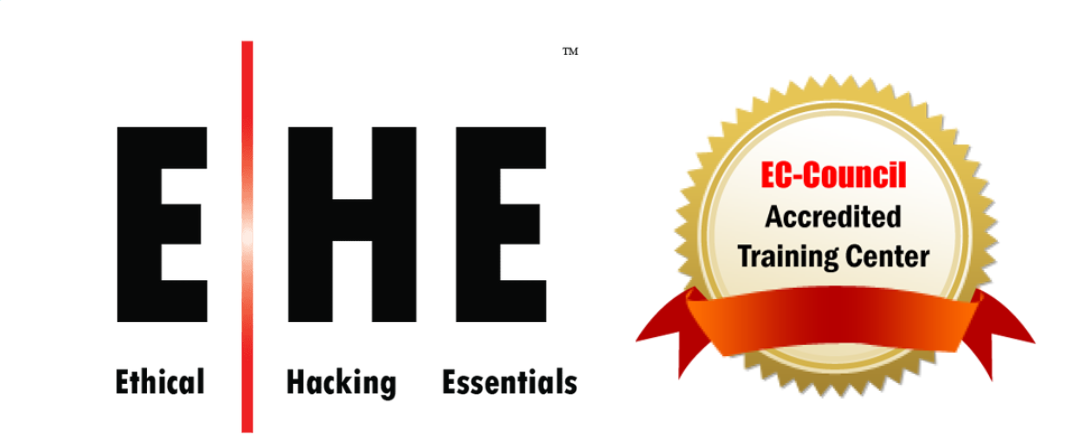
Ethical Hacking Essentials (E|HE)
Unical Academy, in collaboration with EC-Council, invites you to enhance your cybersecurity skills with the Ethical Hacking Essentials (E|HE) course. This globally recognized certification program includes comprehensive training and an exam voucher, giving you the expertise to protect systems from cyber threats.
Take the next step in your career and become a certified ethical hacker
About the course
- Threats and Vulnerabilities
- Password Cracking
- Web Application Attacks
- loT and OT attacks
- Cloud Computing
Why Should You Join the Ethical Hacking Essential Program?
Cybersecurity Foundation
You'll learn core concepts in computer and network security, making it an ideal starting point for anyone looking to break into the cybersecurity field.
Hands-on Learning Experience
This program emphasizes practical, real-world skills with hands-on labs and exercises. You’ll work on live simulations, gaining the experience needed to tackle real cybersecurity challenges confidently.
Career-Ready Skills
Upon completion, you'll be ready for entry-level roles such as cybersecurity analyst, systems analyst, or incident analyst. The program equips you with in-demand skills to fast-track your career in cybersecurity.
Key Features

15+ hours of premium self-paced video training

11 lab activities in a simulated lab environment

750+ pages of ecourseware

Capstone Projects with Real-World CTF Challenges

Year-long access to courseware and 6-month access to labs

Proctored exam voucher with one-year validity

Increase your value in the job market to advance your career

Get globally recognized certification by EC-Council
Enquire Now
- Understand key issues plaguing the information security landscape, along with relevant laws and standards.
- Learn the fundamentals of ethical hacking.
- Identify information security threats and vulnerabilities.
- Explore various types of malware.
- Master different password-cracking techniques and their countermeasures.
- Recognize social engineering techniques, insider threats, identity theft, and how to mitigate them.
- Gain knowledge of network-level attacks such as sniffing, denial-of-service, and session hijacking, along with their countermeasures.
- Understand application-level attacks, including web-server attacks, web application vulnerabilities, and SQL injection, along with mitigation strategies.
- Learn about wireless encryption, threats, and countermeasures for securing wireless networks.
- Study mobile platform attack vectors, mobile device management, security guidelines, and relevant tools.
- Delve into IoT and OT concepts, their potential attacks, and corresponding countermeasures.
- Understand cloud computing technologies, related threats, attacks, and security techniques.
- Grasp the fundamentals of penetration testing.
Exam Code112-52
| Certification Name | E|HE(MCQ Exam) |
|---|---|
| Exam Format | Multiple Choice Questions |
| Number of Questions | 75 Questions |
| Exam Duration | 2 hrs |
| Material | 750+ pages of ecourseware |
- Students, Fresh Graduates, and Career switchers: Ideal for those just starting their career or looking to shift into cybersecurity, regardless of prior work experience.
- IT/Technology/Cybersecurity Teams: Suitable for teams with little to no practical cybersecurity experience who want to strengthen their foundational knowledge.
- Aspiring Cybersecurity Professionals: Perfect for anyone who wants to begin their cybersecurity career and gain mastery over security fundamentals online.
- IT Education Seekers: A great fit for individuals looking to enhance their IT education while preparing for a cybersecurity career.
- Professionals Exploring Cybersecurity: Designed for professionals who are interested in transitioning to cybersecurity but are unsure of where to begin their educational journey.
Course Curriculum
- Information Security Fundamentals
- Information Security Laws and Regulations
- Cyber Kill Chain Methodology
- Hacking Concepts and Hacker Classes
- Different Phases of Hacking Cycle
- Ethical Hacking Concepts, Scope, and Limitations
- Ethical Hacking Tools
- Passive Footprinting to Gather Information About a Target
- Network Scanning to Identify Live Hosts, Open Ports and Services and Target OS in the Network
- Enumeration on a System or Network to Extract Usernames, Machine Names, Network Resources, Shares, etc.
- Threat and Threat Sources
- Malware and its Types
- Malware Countermeasures
- Vulnerabilities
- Vulnerability Assessment
- Password Cracking Techniques
- Password Cracking Tools
- Password Cracking
- Countermeasures
- Perform Active Online Attack to Crack the System’s Password
- Audit System Passwords
- Social Engineering Concepts and its Phases
- Social Engineering Techniques
- Insider Threats and Identity Theft
- Social Engineering Countermeasures
- Social Engineering Using Various Techniques to Sniff Users’ Credentials
- Detect a Phishing Attack
- Packet Sniffing Concepts
- Sniffing Techniques
- Sniffing Countermeasures
- DoS and DDoS Attacks
- DoS and DDoS Attack Countermeasures
- Session Hijacking Attacks
- Session Hijacking Attack Countermeasures
- Perform MAC Flooding to Compromise the Security of Network Switches
- Perform ARP Poisoning to Divert all Communication between Two Machines
- Detect ARP Attacks using ARP Spoofing Detection Tools to Ensure Data Privacy
- Perform DoS and DDoS Attacks using Various Techniques on a Target Host to Prevents Access to System Resources for Legitimate Users
- Detect and Protect Against DDoS Attack
- Perform Session Hijacking to Seize Control of a Valid TCP Communication Session Between Two Computers
- Detect Session Hijacking Attempts using Manual Method
- Web Server Attacks
- Web Server Attack Countermeasures
- Web Application Architecture and Vulnerability Stack
- Web Application Threats and Attacks
- Web Application Attack Countermeasures
- SQL Injection Attacks
- SQL Injection Attack Countermeasures
- Perform a Web Server Attack to Crack FTP Credentials
- Perform a Web Application Attack to Compromise the Security of Web Applications to Steal Sensitive Information
- Perform SQL Injection Attacks on a Target Web Application to Manipulate the Backend Database
- Detect SQL Injection Vulnerabilities using SQL Injection Detection Tools
- Wireless Terminology
- Wireless Encryption
- Wireless Network-Specific Attack Techniques
- Bluetooth Attacks
- Wireless Attack Countermeasures
- Perform Wi-Fi Packet Analysis
- Perform Wireless Attacks to Crack Wireless Encryption
- Mobile Attack Anatomy
- Mobile Platform Attack Vectors and Vulnerabilities
- Mobile Device Management (MDM) Concept
- Mobile Attack Countermeasures
- Hack an Android Device by Creating Binary Payloads
- Secure Android Devices using Various Android Security Tools
- IoT Concepts
- IoT Threats and Attacks
- IoT Attack Countermeasures
- OT Concepts
- OT Threats and Attacks
- OT Attack Countermeasures
- Perform Footprinting using Various Footprinting Techniques
- Capture and Analyze IoT Device Traffic
- Cloud Computing Concepts
- Container Technology
- Cloud Computing Threats
- Cloud Attack Countermeasures
- Perform S3 Bucket Enumeration using Various S3 Bucket Enumeration Tools
- Exploit S3 Buckets
- Fundamentals of Penetration Testing and its Benefits
- Strategies and Phases of Penetration Testing
- Guidelines and Recommendations for Penetration Testing
FAQs
Ethical Hacking, or penetration testing, is the lawful process of identifying weaknesses and vulnerabilities in an organization’s systems, networks, and applications before malicious hackers exploit them. It’s essential for protecting the security and integrity of an organization’s infrastructure against cyber threats.
Enrol and complete the course offering by Unical Academy, Upon successfully completing the Ethical Hacking Essentials program and passing the exam, you can obtain the certification, validating your skills and readiness to kickstart your career in cybersecurity.
If you want to switch your career to cybersecurity, it is wise to gain foundational cybersecurity knowledge from courses that equip candidates with entry-level skills, like EC Council’s Essentials Series by Unical Academy. Focused on eight crucial cybersecurity areas, this series provides hands-on lab experiences to face real-world scenarios.
Yes, Ethical Hacking Essentials (E|HE) is for beginners and career switchers. If you are interested in switching or starting your career in cybersecurity, E|HE can be ideal for developing the core fundamental skills and knowledge required to enter this domain. The E|HE course caters to high school students, career switchers, and any IT professionals with little or no previous experience in cybersecurity.
The E|HE caters to anyone who wants to start a career in cybersecurity or gain fundamental knowledge in ethical hacking. If you are a high school or university student, an IT or tech professional looking towards building a cybersecurity career, you can enroll in Ethical Hacking program.
Yes, acquiring the E|HE certification enhances your employment prospects and can help you launch a career in cybersecurity. The E|HE course is designed to equip you with fundamental technical skills sought by employers making you eligible for starting entry-level cybersecurity positions like Security Analyst or Junior Penetration Tester. It provides hands-on training, preparing individuals for real-world challenges in the field. Further, therecognition gained through the EC-Council certification helps you validate your competencyand skills in the field.
